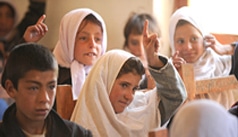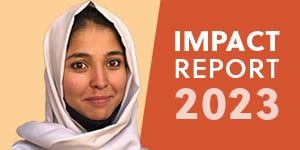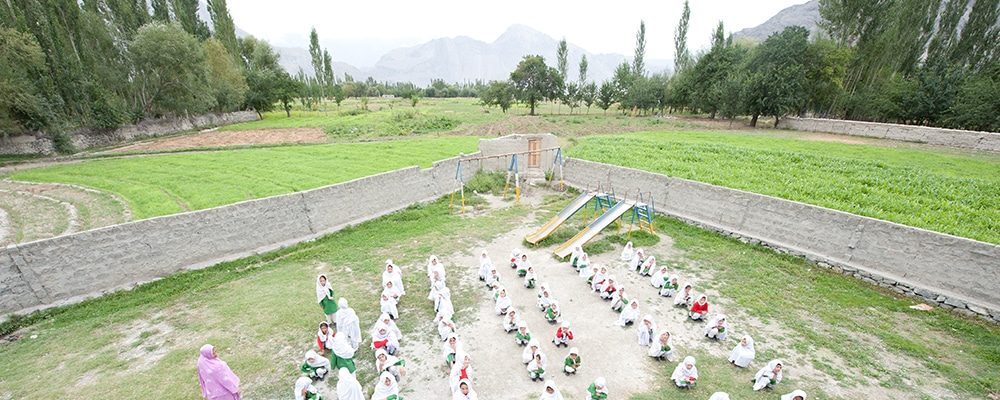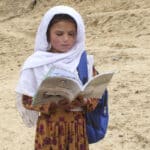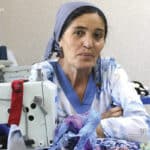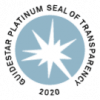CAI HERO: Naseem Parveen
 Naseem Parveen is Central Asia Institute’s (CAI) mission all rolled up in one person.
Naseem Parveen is Central Asia Institute’s (CAI) mission all rolled up in one person.
She is female. Her impoverished family was devastated by a natural disaster that nearly derailed her education. But with CAI’s help she stayed in school and completed her college degree. Now, at age 22, she’s giving back with a six-month voluntary teaching position in a remote CAI school. After that, she hopes to pursue a master’s degree.
But that’s not all. “Her story is different than the others because both her parents are disabled,” said Saidullah Baig, CAI’s project manager in the Gilgit-Hunza region of northern Pakistan. “Both her mother and father are deaf and dumb and Naseem is the only person who can talk to them. She has three brothers and wants to start working so she can help give education to her brothers, otherwise they will not be able to continue their education.”
The oldest daughter of four children, Naseem grew up in Gulmit, Gojal, a village on the Hunza River north of Gilgit. Her parents are subsistence farmers, growing small amounts of wheat and raising a few livestock. Their simple home was in a mountainous area with few modern amenities. “When I was young, at that time there was no electricity, phone and mobile system, although now these facilities are available,” Naseem said.
She started school at the government school in Gulmit, then switched to Al Amin Model School, a co-ed school about 2 kilometers from her home.
“My parents helped me a lot in my education,” she said. “My mother and father both are uneducated and disabled, but they did not stop me from school. Only sometimes I didn’t attend my school because of domestic work and helping my mother in the field.
But she faced some financial hardships. “I faced challenges like paying my school fees, uniform, shoes, up to 10 grade.”
TRAGEDY STRIKES
Her life changed dramatically in January 2010, when a massive landslide thrust an entire village into the Hunza River, killing 20 people. The slide also blocked the flow of water and created a giant lake upstream, flooding villages and creating massive upheaval for thousands of people.
“There was a big disaster in our region when the Attabad village fell down and blocked the Hunza River,” she said. “The water covered all of our land and house. There was a darkness in our lives. We couldn’t continue our education. Even survival was difficult for us. My future was looking dark.”
But as the Persian proverb says: When it is dark, you can see the stars.
Naseem was about to start class 10 at the time of the slide (the school year runs from March to December in the mountains of northern Pakistan), but the repercussions of the disaster had her doubting that she would ever be able to finish high school
“So I was surprised when a man, Sarfraz Khan, came to our village and announced Central Asia Institute
[would] help the affected students to continue their education,” she recalled. Sarfraz was CAI’s most-remote areas project manager. He died in 2012.
When CAI stepped in to help, she said, she decided to become a teacher. “Since that day I thought that if I could complete my education, I will start teaching, help my parents, and help my brothers to continue their education,” she said.
She finished class 10 in a tent school set up by CAI near the landslide area. Then, with the help of a CAI scholarship, she moved to a women’s hostel in Rawalpindi, Pakistan, just outside Pakistan’s capital city of Islamabad, and attended two years of college. When CAI reorganized its Pakistan scholarship program in 2011-12, she returned to the northern areas and completed her college degree in sociology, with emphases in education and Arabic.
PAY IT FORWARD
Ever since CAI’s scholarship program began in the Gilgit region in the late 2000s, Baig has emphasized that the students should find ways to give back. In the past it had been mostly a suggestion, he said, but now he’s organized a program to make it happen.
“The idea is to encourage our scholars to community service and give them some teaching experience,” he said. “As you know, there are few job opportunities in these areas. In the past, we appointed a few CAI scholarship students who completed their education as teachers in different CAI-supported schools, but it is impossible to give jobs to all of our scholars. Some are getting jobs in different organizations. But many don’t have chance.
“So this year we thought it would be good to have internship program. In April, 25 students completed college graduation and offered themselves for service,” he said. “I placed two at a government primary school we support, three at CAI’s Ganjabad High School and four at Majaweer Middle School.” CAI provides a stipend to cover each intern’s room and board in the village.
When their six-month service ends in November, Naseem and the other interns will return to school for master’s-level (16 class) education, he said.
And a month later, another 25 CAI-supported scholarship students will finish their master’s degrees “and we will choose a few students and send them to different CAI-supported schools as volunteer teachers for four to six months,” Baig explained. “This will be continued for as long as the scholarship program is going on. It is a good time to start because now our scholarship students are in different stages. After every semester a few are completing graduation at different levels.”
ON-JOB TRAINING
Naseem was posted to Majaweer School, in the Ishkoman Valley of the Ghizer District, where she said she has happily settled into teaching English, social studies, and science to middle school students.
“I started teaching just after I finished my exam paper in April 2014,” she said. “This area is more remote than the area where from I belong, but the school is good and there are so many students. But all of them are studying free of tension because CAI is supporting them fully: fees, books, and other requirements.”
But she’s not just a teacher. She’s also a role model. In 2013, all of the students in Majaweer’s class eight said their mothers were illiterate; just one girl’s father had a primary- school education. Coming to school and seeing female teachers with college and university degrees makes a difference for all students, but especially for the girls.
Girls’ education is not a new idea in the region, she said. Everybody knows “education is important for girls because with education we can do anything.” The girls who don’t go to school, usually that’s “due to poverty,” she said. And, “in the areas where there is no school and they can’t get education, they are forced to marry in teenage, 14 to 18.”
She added that she is not married. “I want to complete my education and my brothers’ education is also important. If I marry soon, then both of this will be incomplete.”
Her teaching experience, albeit minimal, has already shown her that too often teachers are underpaid and classrooms overcrowded. Both cut into the teacher’s ability to concentrate, she said. And all teachers need training, no matter where they are in their careers. “I need this training, too, because then I can teach better than I am.”
She will get that training, and much more, during her master’s studies at Karakoram International University. After that? She plans to return to teaching.
“I think CAI and Dr. Greg are the angels in our life who give us a chance to improve our life. Otherwise it would be impossible for me to continue my education and become a teacher even,” she said. “Not only me. I know there are thousands of other girls whose life has been changed because of CAI’s help. CAI is always in my prayers.”
